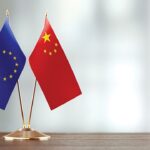Editor’s Note:
In Beijing, the essay topic for the English test of this year’s gaokao focuses on the 75th anniversary of the founding of the People’s Republic of China. Chinese middle school student Li Hua was asked to offer some suggestions to his foreign friend Jim, who wants to write a piece on this subject. To help enlighten Jim as well as those who are interested in China’s development, the Global Times invited several foreign experts and observers to share their insights on China’s great achievements in various spheres over the past seven and a half decades. This is the fourth piece of the series.
Almost 75 years ago, “The Chinese people have stood up!” – Mao Zedong proclaimed on October 1, 1949, in Beijing, as he announced the establishment of the People’s Republic of China. Following a horrific civil war, the violent trauma of Japanese aggression and a century of humiliation from Western powers, the people of China looked forward to a new beginning. Their country was impoverished, a peasant nation where the average annual earnings constituted a mere 49.7 yuan ($6.85), and the average life expectancy was just 35 years old in 1949.
But fast forward 75 years, China is a very different place. The elderly of today, those in their 80s, are able to share their experiences with younger people of the dramatic transformation that their country has witnessed over the course of their own lifetimes. No longer is China a backward, helpless, or impoverished country. It has developed to become an economic giant and the largest commercial and industrial nation on earth. From 35 years, China’s average life expectancy has more than doubled to 78 years, overtaking the US, while the nationwide per capita disposable income was 39,218 yuan in 2023, even surpassing some countries in Europe.
This rapid economic development has seen China become a world leader in infrastructure in a short space of time. Since 2008, the country has assembled the world’s largest high-speed rail network at 43,700 kilometers and 259 airports. China’s major cities, such as Shanghai, Beijing and Shenzhen have effectively become world leaders in business, manufacturing, technology and education. The iconic skyline of Shanghai’s Lujiazui, which just 45 years ago did not even exist, is a testament to China’s success in “reaching the sky” and its rapid pace of change. The city has also become home to some of the world’s most famous attractions, such as Disneyland and Legoland Park.
The development of China’s communications infrastructure is equally impressive with over 3.748 million 5G base stations. Similarly, it has become a world leader in renewable energy infrastructure. China has also become the world’s largest exporter of cars and electric vehicles have made breakthroughs in particular, overtaking traditional market heavyweights in the sector such as Japan.
Besides, China is no longer a nation “in need of help” but a nation that frequently “offers help” on the global stage. From its own development experience, China has become a critical source of aid, support and development for the Global South, with its model standing as a great inspiration. Projects such as the Belt and Road Initiative have connected nations and provided opportunities throughout the world, through landmark projects such as the China-Laos Railway, the China-Europe Railway and the China-Pakistan Economic Corridor. China is changing the global economic landscape for the better. Once a nation in need of development, China has become an “exporter” of development. Through its population size and growing consumerism, China has become the largest and most lucrative export market in the world for many countries, offering unparalleled opportunities.
But more importantly, for the Chinese people, China has been able to escape the humiliation of the past. The PRC is creating a strong, unified and sovereign Chinese state that breaks from the oppression, subjugation and colonialism of the old. The country has the strength to repel foreign aggression, to protect its territorial integrity and to ensure the horrors of the past will never be repeated.
Over the past 75 years, lost regions such as Hong Kong have been returned to China with separatism crushed, with reunification on the agenda for Taiwan island. From the perspective of three-quarters of a century, China has entered a new age, one which its people have long deserved and been longing for. It has overcome great trauma and difficulty to establish itself as a modern country, which its population can benefit from and take pride in.
The author is a political and historica













